Shantung and Taishan 1996 (2024 reminiscences)
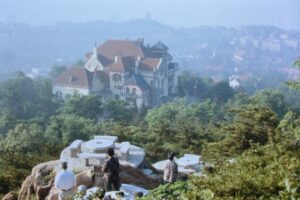 I was (and still am) fascinated with Qingdao, and in May 1996, after leading a May Term, indulged that interest in touring the Shantung peninsula. It was my first trip in China on my own, which meant, essentially, going from town to town in a car with driver. The driver was Feng Hong, or “red wind,” a classic Cultural Revolution name. His English was confined to “Michael Jordan #1,” incontestably true for the greatest of all time. In fact, one of my fondest memories of Michael Jordan was watching a finals game in a yogwan in Korea (a room with a condom dispenser). The announcer (Taiwanese) watched Jordan float from the top of the key to the basket, and said, “Wow.” Not a Chinese word, but a universal description of MJ.
I was (and still am) fascinated with Qingdao, and in May 1996, after leading a May Term, indulged that interest in touring the Shantung peninsula. It was my first trip in China on my own, which meant, essentially, going from town to town in a car with driver. The driver was Feng Hong, or “red wind,” a classic Cultural Revolution name. His English was confined to “Michael Jordan #1,” incontestably true for the greatest of all time. In fact, one of my fondest memories of Michael Jordan was watching a finals game in a yogwan in Korea (a room with a condom dispenser). The announcer (Taiwanese) watched Jordan float from the top of the key to the basket, and said, “Wow.” Not a Chinese word, but a universal description of MJ.
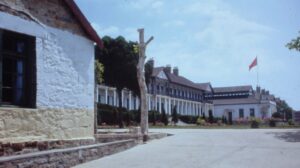
We went to Qingdao, Yantai (Chefoo), and Wei Hai Wei, three of the important treaty ports on the peninsula. I was surprised by how much of the colonial areas were still extant. Mornings in Qingdao definitely required joining in dancing on the squares in front of the Bavarian style Catholic Church.
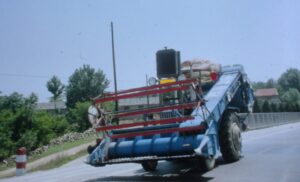 I also remember asking Feng Hong to stop at one point so I could take pictures of a harvesting team of machinery that was the most mechanized agriculture I had ever seen in China. Combines in China. A first.
I also remember asking Feng Hong to stop at one point so I could take pictures of a harvesting team of machinery that was the most mechanized agriculture I had ever seen in China. Combines in China. A first.
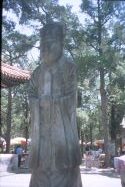 One other stop was a note worthy: Qu’fu, the home of the Great Sage, Confucius. The main shrine was massive, a paean to the importance (reemphasized in contemporary
One other stop was a note worthy: Qu’fu, the home of the Great Sage, Confucius. The main shrine was massive, a paean to the importance (reemphasized in contemporary 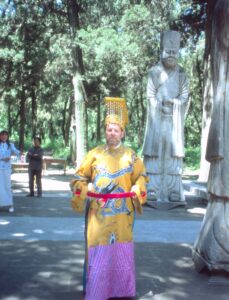 China) of a philosopher who encouraged order and obedience. The Confucian exams for centuries defined winners and losers in the civil service, and remnants of the rote learning it required are still embedded in China’s educational system. Qu’fu was one of the few places in China I saw stars and heard birds (not in cages). It was tranquil, in other words.
China) of a philosopher who encouraged order and obedience. The Confucian exams for centuries defined winners and losers in the civil service, and remnants of the rote learning it required are still embedded in China’s educational system. Qu’fu was one of the few places in China I saw stars and heard birds (not in cages). It was tranquil, in other words.
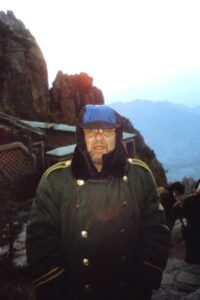 The literal highlight of course was Tai Shan, one of the most sacred mountains in China. It’s where Mao said, “The East is Red,” but Confucius sagely remarked, “The Earth is small.” I stayed in a Chinese-speaking
The literal highlight of course was Tai Shan, one of the most sacred mountains in China. It’s where Mao said, “The East is Red,” but Confucius sagely remarked, “The Earth is small.” I stayed in a Chinese-speaking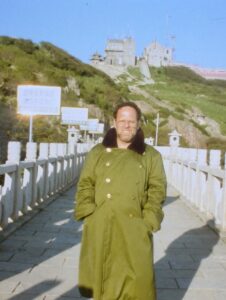 guesthouse. At an ungodly hour, the phone rang and a voice announced (my translation—get up and get dressed, daybreak is coming). There was a PLA topcoat in the closet to protect me from the mountain chill; I threw it on and joined the throngs there to watch the sun come up over China. You can see me in the pictures: I’m the one without the cigarette.
guesthouse. At an ungodly hour, the phone rang and a voice announced (my translation—get up and get dressed, daybreak is coming). There was a PLA topcoat in the closet to protect me from the mountain chill; I threw it on and joined the throngs there to watch the sun come up over China. You can see me in the pictures: I’m the one without the cigarette.
Subsequently, in mangled Chinese, I assured others I was from Shantung, which is why I talked and looked funny. Ironically, David’s wife’s family is from Shantung, and reached the US via Korea and Taiwan.